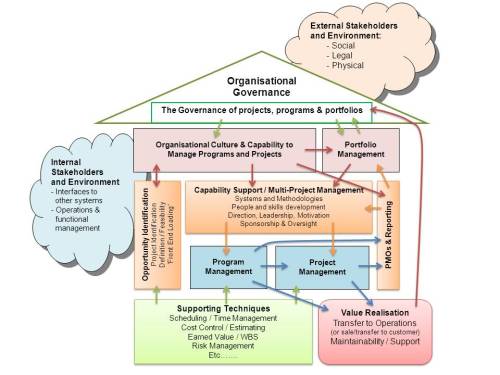My last couple of posts have identified a gap in the overall management of projects and programs that is present in most organisations. This ‘Zone’ covers a range of organisational capabilities from the innovation and assessment of ideas that may develop into projects through to achieving the value the project was created to enable; see: Disappearing into the Zone.
Effective project or program management cannot save a project that has been set up to fail by the organisation. Doing the wrong project ‘right’ or doing the right project as ‘right as possible’ with inadequate funding, resources, skills and management support may reduce the extent of the disaster but cannot prevent failure; see: Cobb’s Paradox is alive and well.
The solution to this perennial problem, first identified by Cobb in 1995, is for the organisation’s leadership to demand that their executive create an effective project delivery capability (PDC). This name is suggested to place focus on the delivery of value to the organisation as a result of doing the ‘right’ projects ‘right’. Managing the selected projects effectively is just one step in this overall value chain.
PDC includes all of the aspects of project delivery discussed in our White paper PPP Taxonomy and outlined above, with a focus on realising value for the organisation.
Implementing an effective and rigorous PDC structure will require a major change effort in many organisations and will challenge existing cultures, particularly the tendency to focus on ‘project failure’ rather than ‘organisational failure’ when the organisation fails to adequately manage the management of its projects. The extent of this challenge is outlined in our White Paper Organisational Change Management.
The three layers of PDC are defined above:
- Governance – the organisations directors / leaders have to set the right strategy, ask the right questions and require the right answers from their executive.
- Executive management (Purple) are responsible for creating the capability and culture of accountability needed to deliver projects successfully and realise the intended benefits. A key element in this is developing a rigorous portfolio management capability to select the best projects to fulfil the organisation’s strategy, based on consideration of each project’s feasibility and viability, within the organisational constraints of capability and capacity.
- Organisational support processes (Orange) including opportunity identification and assessment, plus developing and enhancing the organisation’s project delivery capability including: organisational enablers, support systems, oversight systems, change management systems and value realisation.
Program management can fulfil some of these support functions where several projects are being managed in an integrated way to maximise benefits. However, where programs are used by the organisation, the organisation’s overarching support processes need to be capable of supporting and overseeing the work of the programs as well as other independent projects.
PDC reframes the project delivery/success paradigm. Change is needed, the approaches currently used in many organisations are generating project failure rates in excess of 50% and to keep doing the same thing, expecting different outcomes is, to quote Einstein, ‘the definition of insanity’!
Focusing on developing an effective PDC will enable organisations to improve the way they manage the ‘doing of their projects’ and as a consequence increase the success rate resulting in increased value for their stakeholders. The ROI from improving an organisation’s PDC should be significant!





Hi Lynda, an interesting post. From my perspective Risk and Opportunity management should play a significant part in the strategic, corporate, portfolio, program, project and operational parts of the business and support the overall governance framework. I look at risk management to be more than a supporting technique.
All supporting techniques are critical to the creation of value, including determining the right amount of risk to accept for a commensurate reward.
However, risk management cannot innovate or identify opportunities, define real business needs, generate change, or realise benefits to create value. The risk and opportunities associated with an initiative are vital considerations as are cost, timing and many other interlinked factors.
PDC is intended to create a holistic end-to-end approach to creating value from investments in projects and programs. The pragmatic management of risk is one aspect within this overall framework; important, but only valuable if it is properly integrated with all of the other aspects needed to generate value.
The problem currently confronting most organisations is the piecemeal approach to the overall need to create value. ‘Project Management’ focuses on the bit between initiating and delivery’, benefits realisation on the bit after delivery, etc. Maximum value is created by harmonising all aspects of a project’s lifecycle from initiation of an idea to the realisation of value.